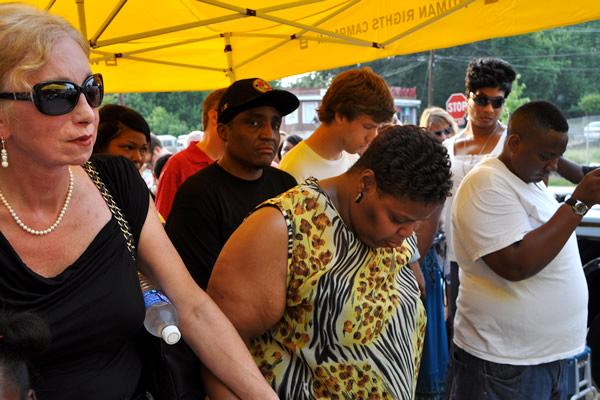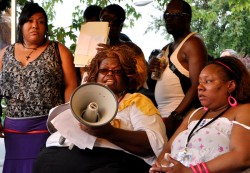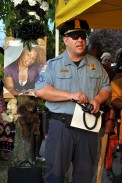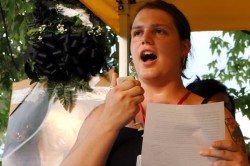Local
Emotions run high at vigil for slain trans woman
200+ gather for vigil; police say shooting followed ‘exchange of words’ with two males
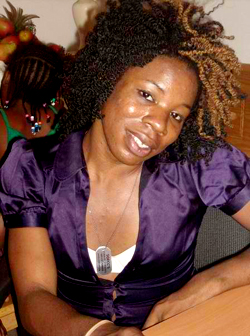
More than 200 people turned out Saturday night, July 23, for a vigil to honor Lashai Mclean, a 23-year-old transgender woman who was shot to death three days earlier in Northeast Washington.
The event took place at the site where police say Mclean was gunned down about 4:30 a.m. near the corner of 61st and Dix Streets, N.E. Among those attending were Mclean’s mother and other grieving family members and relatives.
Deputy D.C. Police Chief Diane Groomes, who spoke at the vigil, said later that homicide detectives are pursuing information provided by a witness that the fatal shooting took place shortly after two unidentified males “had some words” with Mclean in an alley shortly before she was shot.
“The motive is still not clear to us,” Groomes told the Blade after the vigil. Groomes said police haven’t found evidence of either a robbery or a hate crime in the early stages of the investigation.
Neighborhood residents and passersby looked on with interest as more than a dozen speakers, including D.C. Deputy Mayor for Public Safety Paul Quander, condemned the murder and called on the community to speak out against violence targeting the transgender community.
“To the family and to the community, I want you to know that we are committed to making sure that justice is done, that this life that has touched many of us will be remembered and the life that she led will be remembered,” said Quander, whose duties include overseeing city law enforcement agencies.
“We will always be reminded that what happens to one happens to all of us,” he said. “Injustice to one is injustice to all of us and that in this society no intolerance will be accepted.”
Several of Mclean’s family members, including her mother, joined vigil participants by sitting in chairs or standing under a tent set up on the sidewalk on an evening when the temperature reached 100 degrees.
The mother, who was not identified by name, became overcome by grief at the conclusion of the vigil and suffered a seizure. She was taken by ambulance to a hospital in a development that compounded the grief of other family members.
Two other male family members were being held by police at the site of the vigil after getting into a scuffle with each other on the street where many vigil goers were standing. Police confiscated a tire iron from one of the two men.
“We’re sorting it all out, but emotions are high among the family,” Groomes said later. “They lost their loved one. You saw the mother, the sisters, aunts and uncles, the loved ones, and they’re very distraught.”
During the vigil, Groomes and Sgt. Brett Parson, former head of the department’s Gay & Lesbian Liaison Unit, called on the community to provide police with any information that may lead to the identification of those responsible for Mclean’s murder.
Parson now works as a patrol supervisor in the Six District, where the incident occurred.
“I know that many of you are hurting right now,” he said. “I know that many of you are angry. And you have a right to be because any time a member of our family is taken from us in such a violent way it should make our entire community angry,” he said.
“I want you to know that we get it. We understand that the anger is not just that Lashai was gunned down senselessly,” he said. “But it’s that Lashai was forced to be in a place and time to be ripe for victimization and that those circumstances have to change.”
Although Parson did not say so directly, he may have been referring to the fact that Mclean was shot shortly after 4 a.m. in an alley near the corner of 61st and Dix Streets, N.E., which is a location well known as a gathering place for transgender prostitutes and the men that patronize their services.
Groomes said police could not immediately determine whether the incident was prostitution related but said investigators were looking into that as a possibility.
“This is an area where there are transgenders that hang out,” she said. “So how do we know that someone filled with hate didn’t come up here and do this?” she told the Blade.
“It’s not clear. Right now we’re not saying anything – we don’t hear anything about hate-bias overtones. So it’s frustration. I mean, what is it?” she said.
Court records show that Mclean was arrested on a charge of “inviting for purposes of prostitution” on Aug. 5, 2010 at 4:45 a.m. on the unit block of K Street, N.E. as part of a sting operation conducted by undercover male D.C. police officers.
Records filed in D.C. Superior Court show that Mclean accepted an offer by the U.S. Attorney’s office to enroll in a court diversion program operated by the local group Helping Individual Prostitutes Survive (HIPS). The program called for Mclean to successfully complete eight sessions of HIPS’ Trans-In-Formation program, a counseling and self-help program that HIPS created under a federal grant to enable transgender sex workers avoid prosecution when arrested on solicitation related charges and become productive citizens.
Court records show Mclean successfully completed the program and the U.S. Attorney’s office dismissed the charge against her on May 9 of this year.
HIPS Executive Director Cyndee Clay said Mclean worked well in the program and the group was pleased to help her. At the vigil on Saturday, HIPS Outreach Manager Jenna Mellor told the gathering she was honored to have known Mclean.
“Every time you talked to Shai you really knew how strong she is,” Mellor said. “And it’s an inspiration to see someone live that strongly every day.”
Earline Budd, an official with the local group Transgender Health Empowerment, and Ruby Corado, a member of the D.C. Trans Coalition, were the lead organizers of the vigil. Both described Mclean as a vibrant, charming, and outspoken young woman who made a lasting impression on everyone who came in contact with her.
Budd and other transgender activists have said workplace discrimination against transgender people often forces young transgender women into prostitution as a means of survival.
D.C. Trans Coalition member Vanessa Crowley told the gathering that Mclean’s murder was another in a series of violent crimes targeting transgender women in the city in recent years. She noted that Mclean’s murder comes two years after a transgender woman was stabbed to death in August 2009 “in broad daylight” in the city’s Shaw neighborhood in a case that remains unsolved.
“While nothing can bring back those that we have lost or undue the suffering that we share, we can and should confront the daily terror and anxiety that trans and gender non-conforming people face,” Crowley said. “We can do this by building networks of mutual support and solidarity and sustain our efforts to feel safe and to make change.”
Crowley also made reference to an initial police news release that identified Mclean by her legal birth name of Myles Mclean and did not list the case as that of a transgender related murder.
“We must stress once against the absolute necessity for the police and the media to respect Lashai’s gender identity,” Crowley said. “The least we can do is respect her chosen and lived identity.”
Others speaking at the vigil included A.J. Singletary, president of the Gays and Lesbians Opposing Violence; Jeffrey Richardson, director of the mayor’s Office of LGBT Affairs; Nick McCoy, gay activist and community member of the police department’s Critical Incident Team; Ron Mouton, founder of the local anti-crime group Peaceoholics; David Mariner, executive director of the city’s LGBT community center; Jenna Miller, an official with the local group Helping Individual Prostitutes Survive (HIPS), which provides services to transgender woman involved as sex workers; and Budd and Corado.
Rev. Dyan Abena McCray, pastor of D.C.’s Unity Fellowship Church, which has a largely LGBT congregation, told the gathering in an opening prayer that while the family, friends and community members share feelings of hurt and bitterness over Mclean’s loss, the scripture cautions against vengeance.
“We know that justice is going to reigndown, God,” she said. “We claim jujstice right now…We claim the victory over the adversary right now. He has no power over our lives.”
Virginia
McPike wins special election for Va. House of Delegates
Gay Alexandria City Council member becomes 8th LGBTQ member of legislature

Gay Alexandria City Council member Kirk McPike emerged as the decisive winner in a Feb. 10 special election for a seat in the Virginia House of Delegates representing Alexandria.
McPike, a Democrat, received 81.5 percent of the vote in his race against Republican Mason Butler, according to the local publication ALX Now.
He first won election to the Alexandria Council in 2021. He will be filling the House of Delegates seat being vacated by Del. Elizabeth Bennett-Parker (D-Alexandria), who won in another Feb. 10 special election for the Virginia State Senate seat being vacated by gay Sen. Adam Ebbin (D-Alexandria).
Ebbin is resigning from his Senate next week to take a position with Virginia Gov. Abigail Spanberger’s administration.
Upon taking his 5th District seat in the House of Delegate, McPike will become the eighth out LGBTQ member of the Virginia General Assembly. Among those he will be joining is Sen. Danica Roem (D-Manassas), who became the Virginia Legislature’s first transgender member when she won election to the House of Delegates in 2017 before being elected to the Senate in 2023.
“I look forward to continuing to work to address our housing crisis, the challenge of climate change, and the damaging impacts of the Trump administration on the immigrant families, LGBTQ+ Virginians, and federal employees who call Alexandria home,” McPike said in a statement after winning the Democratic nomination for the seat in a special primary held on Jan. 20.
McPike, a longtime LGBTQ rights advocate, has served for the past 13 years as chief of staff for gay U.S. Rep. Mark Takano (D-Calif.) and has remained in that position during his tenure on the Alexandria Council. He said he will resign from that position before taking office in the House of Delegates.
Local
Local LGBTQ groups, activists to commemorate Black History Month
Rayceen Pendarvis to moderate Dupont Underground panel on Sunday
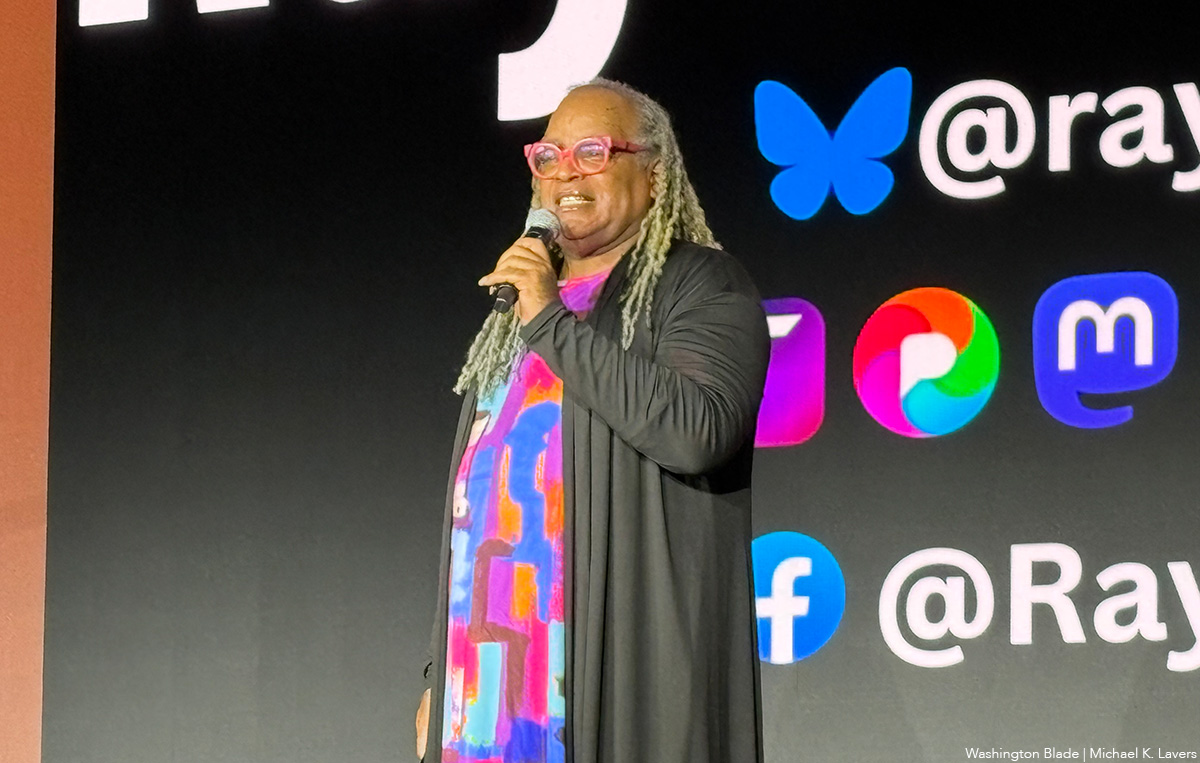
LGBTQ groups in D.C. and elsewhere plan to use Black History Month as an opportunity to commemorate and celebrate Black lives and experiences.
Team Rayceen Productions has no specific events planned, but co-founder Rayceen Pendarvis will attend many functions around D.C. this month.
Pendarvis, a longtime voice in the LGBTQ community in D.C. moderated a panel at Dupont Underground on Feb. 8. The event, “Every (Body) Wants to Be a Showgirl,” will feature art from Black burlesque artists from around the country. Pendarvis on Feb. 23 will attend the showing of multimedia play at the Lincoln Theatre that commemorates the life of James Baldwin.
Equality Virginia plans to prioritize Black voices through a weekly online series, and community-based story telling. The online digital series will center Black LGBTQ voices, specifically trailblazers and activists, and contemporary Black queer and transgender people.
Narissa Rahaman, Equality Virginia’s executive director, stressed the importance of the Black queer community to the overall Pride movement, and said “Equality Virginia is proud to center those voices in our work this month and beyond.”
The Capital Pride Alliance, which hosts Pride events in D.C., has an alliance with the Center for Black Equity, which brings Black Pride to D.C. over Memorial Day weekend. The National LGBTQ Task Force has no specific Black History Month events planned, but plans to participate in online collaborations.
Cathy Renna, the Task Force’s director of communications, told the Washington Blade the organization remains committed to uplifting Black voices. “Our priority is keeping this at the forefront everyday,” she said.
The D.C. LGBTQ+ Community Center is also hosting a series of Black History Month events.
The D.C. Public Library earlier this year launched “Freedom and Resistance,” an exhibition that celebrates Black History Month and Martin Luther King Jr. It will remain on display until the middle of March at the Martin Luther King Jr. Memorial Library at 901 G St., N.W.
District of Columbia
U.S. Attorney’s Office drops hate crime charge in anti-gay assault
Case remains under investigation and ‘further charges’ could come

D.C. police announced on Feb. 9 that they had arrested two days earlier on Feb. 7 a Germantown, Md., man on a charge of simple assault with a hate crime designation after the man allegedly assaulted a gay man at 14th and Q Streets, N.W., while using “homophobic slurs.”
But D.C. Superior Court records show that prosecutors with the Office of the U.S. Attorney for D.C., which prosecutes D.C. violent crime cases, charged the arrested man only with simple assault without a hate crime designation.
In response to a request by the Washington Blade for the reason why the hate crime designation was dropped, a spokesperson for the U.S. Attorney’s office provided this response: “We continue to investigate this matter and make no mistake: should the evidence call for further charges, we will not hesitate to charge them.”
In a statement announcing the arrest in this case, D.C. police stated, “On Saturday, February 7, 2026, at approximately 7:45 p.m. the victim and suspect were in the 1500 block of 14th Street, Northwest. The suspect requested a ‘high five’ from the victim. The victim declined and continued walking,” the statement says.
“The suspect assaulted the victim and used homophobic slurs,” the police statement continues. “The suspect was apprehended by responding officers.”
It adds that 26-year-old Dean Edmundson of Germantown, Md. “was arrested and charged with Simple Assault (Hate/Bias).” The statement also adds, “A designation as a hate crime by MPD does not mean that prosecutors will prosecute it as a hate crime.”
Under D.C.’s Bias Related Crime Act of 1989, penalties for crimes motivated by prejudice against individuals based on race, religion, sexual orientation, gender identity, disability, and homelessness can be enhanced by a court upon conviction by one and a half times greater than the penalty of the underlying crime.
Prosecutors in the past both in D.C. and other states have said they sometimes decide not to include a hate crime designation in assault cases if they don’t think the evidence is sufficient to obtain a conviction by a jury. In some instances, prosecutors have said they were concerned that a skeptical jury might decide to find a defendant not guilty of the underlying assault charge if they did not believe a motive of hate was involved.
A more detailed arrest affidavit filed by D.C. police in Superior Court appears to support the charge of a hate crime designation.
“The victim stated that they refused to High-Five Defendant Edmondson, which, upon that happening, Defendant Edmondson started walking behind both the victim and witness, calling the victim, “bald, ugly, and gay,” the arrest affidavit states.
“The victim stated that upon being called that, Defendant Edmundson pushed the victim with both hands, shoving them, causing the victim to feel the force of the push,” the affidavit continues. “The victim stated that they felt offended and that they were also gay,” it says.
-

 New York4 days ago
New York4 days agoPride flag removed from Stonewall Monument as Trump targets LGBTQ landmarks
-

 Italy5 days ago
Italy5 days agoOlympics Pride House ‘really important for the community’
-

 Florida4 days ago
Florida4 days agoDisney’s Gay Days ‘has not been canceled’ despite political challenges
-

 Philippines4 days ago
Philippines4 days agoPhilippines Supreme Court rules same-sex couples can co-own property

